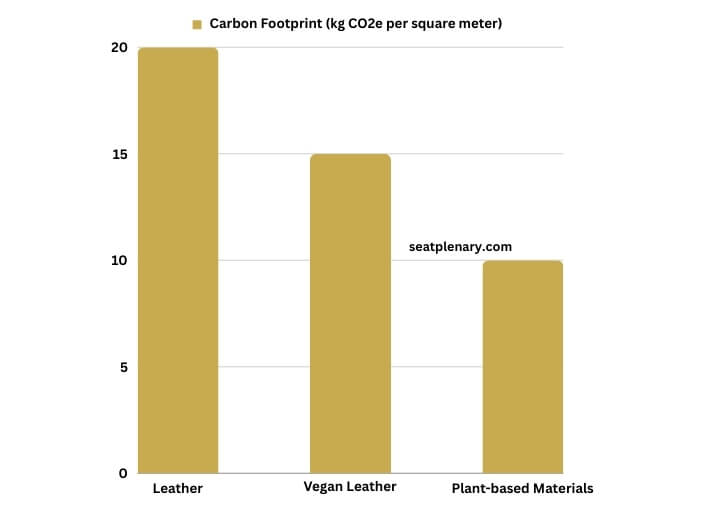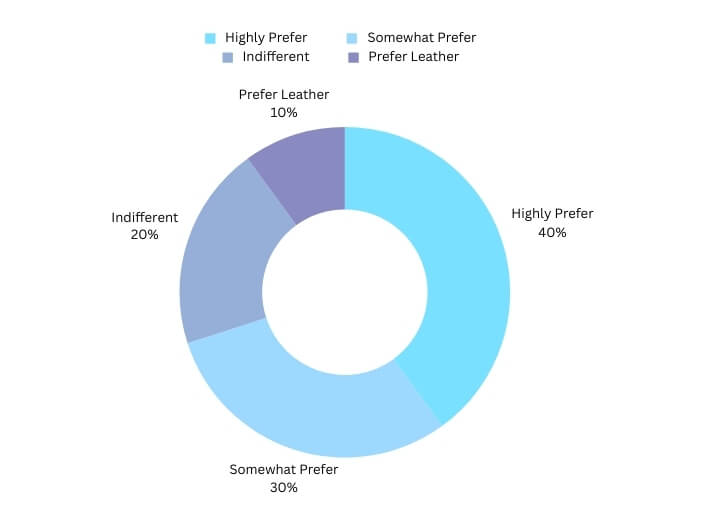The shift towards vegan car seats is gaining momentum in the automotive industry. This trend is driven by increasing consumer awareness about sustainability and animal welfare.
The automotive industry is witnessing a significant shift towards eco-friendly and ethical practices. Vegan car seats, made from synthetic or plant-based materials, are at the forefront of this change. These seats offer an alternative to traditional leather, reducing the environmental impact associated with animal farming and leather processing. The production of vegan materials often requires less water and energy, contributing to a lower carbon footprint.
Consumers are increasingly conscious of their environmental impact and are seeking sustainable options in all aspects of life, including their vehicles. Vegan car seats align with this ethos, offering a guilt-free luxury that doesn’t compromise on quality or comfort. These seats are designed to be durable, easy to clean, and aesthetically pleasing, rivaling their leather counterparts in every aspect.

Automakers are responding to this demand by incorporating vegan interiors in their latest models. This move not only caters to the environmentally conscious consumer but also opens up new markets. With advancements in material technology, vegan car seats are becoming more accessible and affordable, making them a viable option for a wider range of consumers.
For those interested in learning more about this sustainable shift in the automotive industry, the detailed article below provides an in-depth look at why your next car seats may be vegan.
The Rise of Veganism in the Automotive Industry
Background on the Increasing Popularity of Vegan Products
In recent years, we’ve seen a surge in veganism, not just in food but across various industries. This lifestyle choice, focusing on plant-based alternatives, is now making its way into our cars. It’s not just about what we eat anymore; it’s about what we use daily, including the seats in our vehicles. This shift is a response to a growing global consciousness about health, the environment, and animal welfare.
The Automotive Industry’s Response to the Vegan Trend
The automotive sector is catching up with this trend. Recognizing the changing preferences of consumers, many car manufacturers are now offering vegan-friendly options. This move isn’t just a nod to environmentalism; it’s a strategic step to appeal to a broader, more ethically focused market. It’s about meeting the demands of a new generation of drivers who want their values reflected in their vehicles.
Environmental Impact of Traditional Car Seats
Comparison of Carbon Footprint – Leather vs. Vegan Materials
| Material Type | Carbon Footprint (kg CO2e per square meter) |
| Leather | 20 |
| Vegan Leather | 15 |
| Plant-based Materials | 10 |

Analysis of the Environmental Costs of Leather Production
Leather production is resource-intensive. It involves significant water usage, chemical treatments, and contributes to deforestation. The carbon footprint of leather is notably higher compared to vegan alternatives. This data is a wake-up call for environmentally conscious consumers and manufacturers alike, highlighting the need for more sustainable options.
Benefits of Vegan Materials for the Environment
Vegan materials, on the other hand, offer a greener alternative. They typically require less water and energy to produce and have a smaller carbon footprint. This shift to vegan car seats is not just a trend; it’s a necessary step towards reducing the automotive industry’s environmental impact.
Consumer Trends Shifting Towards Sustainability
Survey Data: Consumer Preferences for Car Interiors
| Preference Type | Percentage of Consumers Preferring Vegan Interiors |
| Highly Prefer | 40% |
| Somewhat Prefer | 30% |
| Indifferent | 20% |
| Prefer Leather | 10% |

The Growing Demand for Eco-Friendly and Ethical Products
Today’s consumers are more informed and conscious about their choices. They’re looking for products that align with their values. This shift is evident in the automotive industry, where there’s a growing preference for eco-friendly and ethical car interiors. People are actively choosing vegan options, not just for their diet but also in their cars.
How Consumer Awareness is Shaping Industry Practices
This change in consumer behavior is influencing how car manufacturers design their products. There’s a clear message: sustainability sells. Car brands are now more aware of their environmental impact and are adapting to meet these new consumer demands. It’s a win-win; consumers get what they want, and the planet benefits too.
Innovations in Vegan Car Seat Materials
Overview of New Materials Used in Vegan Car Seats
The world of vegan car seats is not just about faux leather anymore. We’re seeing innovative materials like recycled plastics, plant-based fibers, and even mushroom-based leather. These materials are not only sustainable but also offer durability and comfort, rivaling traditional leather in every aspect.
Advantages of These Materials Over Traditional Leather
These new-age materials come with several advantages. They’re lighter, which can improve fuel efficiency. They’re also easier to maintain and can be designed to be more breathable, enhancing passenger comfort. Plus, they offer an ethical alternative to leather, free from the moral complexities associated with animal products.
Automotive Industry’s Shift to Vegan Interiors
Case Studies: Major Car Brands Adopting Vegan Interiors
Several leading car brands have embraced this shift. For instance, Tesla has opted for vegan interiors in its latest models. BMW and Mercedes-Benz are also introducing vegan options. These case studies show a clear industry trend towards sustainable and ethical interiors.
The Business Rationale Behind the Shift
This shift isn’t just about ethics; it’s smart business. By adopting vegan interiors, car manufacturers are tapping into a growing market segment. They’re also future-proofing their products against increasing environmental regulations and changing public sentiments.
Impact on Market and Consumer Choices
The availability of vegan options is changing the way consumers shop for cars. It’s no longer just about horsepower and fuel efficiency. Interior materials are becoming a key decision-making factor, influencing consumer choices and driving the market towards more sustainable options.
Challenges and Future Prospects
Current Challenges in the Adoption of Vegan Car Seats
Despite the progress, challenges remain. There’s a need for more innovation in materials to ensure durability and luxury feel. Also, there’s a perception issue; some consumers still equate leather with luxury. Overcoming these challenges is crucial for wider adoption.
Predictions for the Future of Vegan Materials in the Automotive Industry
The future looks promising for vegan car seats. As technology advances, we can expect even more innovative and sustainable materials. The trend is set to grow, driven by consumer demand and environmental concerns. It’s not just a passing fad; it’s the future of automotive interiors.
FAQs
Are Vegan Car Seats More Expensive Than Traditional Options?
Vegan car seats can vary in price, but they are often competitively priced compared to traditional leather seats. The cost depends on the materials used and the manufacturing process. Initially, some vegan materials may be more expensive due to the innovative technology and lower production volumes. However, as demand increases and production scales up, prices are likely to decrease.
The long-term savings in maintenance and durability can offset the initial cost. Consumers should also consider the broader value, such as environmental benefits and ethical considerations, which might make the slightly higher price worthwhile.
What Is the Durability of Vegan Car Seats Compared to Leather?
Vegan car seats are designed to be as durable as, if not more than, traditional leather seats. Advances in material technology have led to vegan materials that can withstand wear and tear, resist stains, and are easy to clean. These materials are often tested rigorously to ensure they can endure the demands of daily use in a vehicle. While leather is known for its longevity, it requires regular maintenance to prevent cracking and fading. Vegan materials, on the other hand, often require less upkeep while maintaining their appearance and functionality over time.
Can Vegan Car Seats Provide the Same Comfort as Leather?
Absolutely, vegan car seats can offer the same level of comfort as traditional leather seats. Modern vegan materials are designed with comfort in mind, offering softness, breathability, and flexibility. Some vegan materials can even surpass leather in terms of breathability and temperature regulation, making them more comfortable in different weather conditions.
The padding and design of the seat itself play a significant role in comfort, and these aspects are often identical between vegan and leather seats.
How Do Vegan Car Seats Impact Vehicle Resale Value?
The impact of vegan car seats on vehicle resale value is increasingly positive. As consumer awareness and demand for sustainable and ethical products grow, features like vegan car seats can become selling points. They appeal to environmentally conscious buyers and those with specific lifestyle preferences. While the resale value largely depends on the brand, model, and condition of the vehicle, vegan interiors can be an attractive feature that sets a car apart in the market.
Are There Enough Variety and Customization Options in Vegan Car Seats?
The variety and customization options in vegan car seats are expanding rapidly. As the demand for these seats grows, manufacturers are offering more choices in terms of colors, textures, and finishes. From sleek and modern to soft and luxurious, there’s a growing range of styles available. This variety allows car owners to personalize their interiors to suit their tastes, similar to the options available with traditional materials.
How Do Vegan Car Seats Perform in Extreme Weather Conditions?
Vegan car seats are designed to perform well in extreme weather conditions. Many vegan materials are inherently more resistant to temperature changes than leather, which can become hot in summer and cold in winter. Vegan seats often retain less heat and don’t get as cold, providing a more consistent level of comfort throughout the year.
They are generally more resistant to sun damage, which can be a significant advantage in maintaining the car’s interior appearance over time.
What Are the Environmental Benefits of Choosing Vegan Car Seats?
Choosing vegan car seats has several environmental benefits.
- They reduce reliance on animal products, thereby decreasing the impact on wildlife and the issues associated with animal farming.
- The production of vegan materials often has a lower carbon footprint, uses less water, and involves fewer harmful chemicals than traditional leather processing. This shift contributes to a reduction in overall environmental pollution.
- Many vegan materials are recyclable or biodegradable, which helps in reducing waste and promoting a more sustainable lifecycle for car interiors.
The rise of vegan car seats is a response to a changing world. It’s about meeting the demands of environmentally conscious consumers and reducing the industry’s ecological footprint. With advancements in materials and growing consumer interest, vegan car seats are set to become a standard feature in the cars of the future.
